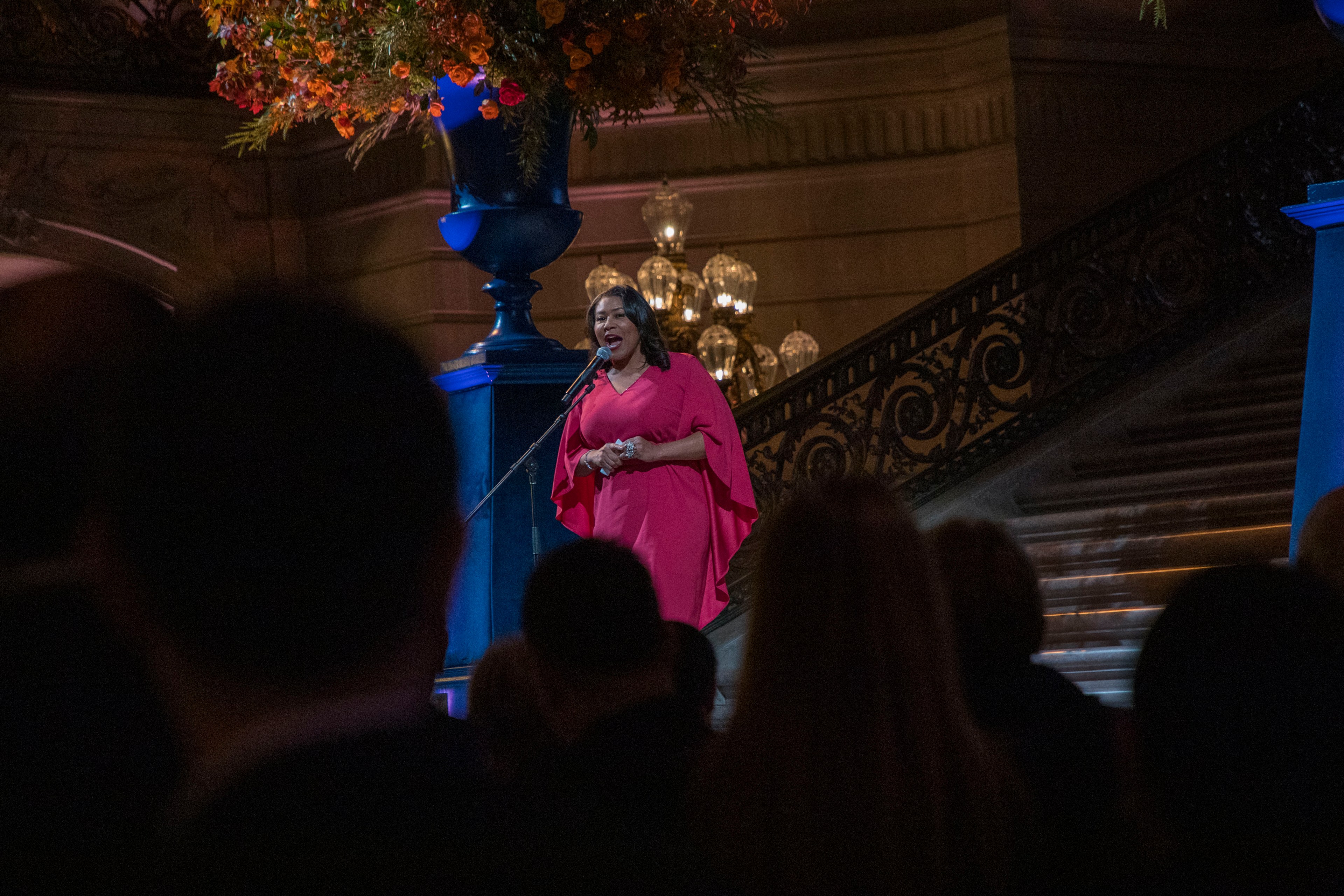Mayor London Breed spent the past several months telling anyone who would listen that the Asia-Pacific Economic Cooperation (APEC) summit—the largest geopolitical event to come to San Francisco in nearly 80 years—should be seen as an opportunity to reset the narrative on a city that has become a national punchline.
The weeklong event has been billed not only as an economic and political gathering for world leaders but also as a chance for San Francisco to show everyone this is still a world-class city despite numerous issues, chief among them homelessness and drugs.
But now that the summit is finally here, San Francisco eschewed rolling out the red carpet Sunday evening and stuck with international orange. Over 100 guests were ushered into a lavish City Hall reception through a ceiling-high model of the Golden Gate Bridge. Visitors had their photos snapped before scooping up glasses of champagne and stepping into the rotunda to find an autumn-hewed function with food, drinks, music and, of course, political speeches.
The mayor and her Office of Protocol raised more than $20 million to host a series of APEC events and fête international media, and Sunday’s party is the first hurdle in what will be a weeklong marathon. On Sunday afternoon, thousands of people took to the streets to protest a variety of causes, from the Israel-Hamas war to conflicts in Myanmar, the Philippines and other countries.
The scene by nightfall was far quieter. A shirtless man used the City Hall sprinkler system to wash himself, but the surrounding streets were otherwise absent of the daily signs of distress that have become so normalized in San Francisco.
Inside City Hall, the celebration—organized with East West Bank to welcome members of the APEC Business Advisory Council—went off without a hitch as a free bar kept glasses full and multiple food stations were set up to serve snacks like prosciutto-wrapped melon, black truffle arancini, crab cakes, artichoke fritters and empanadas. Off to the side, a set piece resembling the Ghirardelli chocolate factory exterior drew visitors to a table with bowls of sweets.
Breed, Lt. Gov. Eleni Kounalakis, Greg Sarris, the chairman of Federated Indians of Graton Rancheria, and East West Bank CEO Dominic Ng delivered remarks in between musical performances by taiko drummers and a jazz band.
Much of the conversation between guests was as banal as any political event, but a few folks in attendance candidly acknowledged that San Francisco felt a little different.
Multiple people admitted they have been taking stock of the noticeably cleaner streets and more vibrant spaces in the Downtown core, much of which is due to an increase in drug enforcement, a clearing of homeless encampments and around-the-clock work by the city’s beleaguered Department of Public Works.
One question, however, is whether the makeover is a sign of progress or little more than a Band-Aid. Is San Francisco capable of maintaining better street conditions not only for the rest of this week, but also in the weeks and months to come?
“Our hope is that the momentum, with everything that we’re already doing, will continue to allow our city to be what we all know it is: a great city,” Breed told The Standard during Sunday’s event. “And we can’t just let a few people get in the way of impacting what it is that we’re trying to do, and that is take care of people and keep the streets clean and safe.”
Planning for APEC has been a nearly three-year process that scaled up significantly after last November’s announcement that San Francisco would serve as this year’s final host city, said Matt Murray, the U.S. APEC ambassador. Previous meetings in Palm Springs, Detroit and Seattle were essentially setting the table for San Francisco.
“You’re thinking about it like, ‘Those [events] are the playoffs, and this is the Super Bowl,’” Murray said. “You’re always planning for the Super Bowl, so we’ve been working.”
The mayor and city officials have their ambitions to rebrand San Francisco, but APEC itself is about accomplishing three specific tasks.
The first goal is for the 21 member economies to end APEC with a strong consensus statement from leaders pledging to work together, Murray said. Second, the event offers a chance for bilateral talks between foreign powers, such as the much-anticipated meeting between President Joe Biden and Chinese President Xi Jinping. And third, APEC invites CEOs from across the globe to meet with government officials to establish more public-private partnerships.
Mainul Mondal, CEO of Ellipsis Health, attended Sunday’s event after his company, which uses AI to facilitate better access to mental health care, made a donation to help the city in its fundraising efforts. He noted that APEC’s member economies make up about 40% of the global GDP and the international gathering is bringing together some of the best business minds in the world.
“Innovation can only work when we have diversity of people,” Mondal said. “The more we understand people, the better off we’re going to be in bringing our innovative technology to scale.”
Sunday’s party was just the first of many APEC events this week in San Francisco. Going under the global microscope will be an opportunity as well as a daunting task. But scaling any success beyond this week will likely be the biggest challenge.
